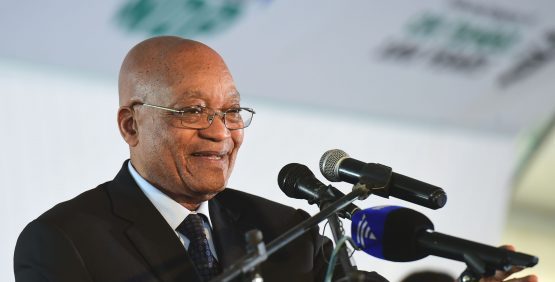Zuma’s days numbered?
February 12, 2018 | Expert Insights

Jacob Zuma, incumbent South African president, has had a political career mired by allegations of corruption. After his most recent controversy where he was alleged to have enabled state capture by the Indian-South African Gupta brothers, he was removed from leadership of the ANC.
Calls for his resignation as President came to a head on Sunday when new ANC leader Ramaphosa announced that the party’s National Executive Committee would convene to discuss Zuma’s future. Should Zuma refuse to resign-- as he has thus far-- he could be voted out of office by his own party.
Background
Jacob Gedleyihlekisa Zuma became President after his party, the African National Congress (ANC) claimed victory in the 2009 general elections. He was re-elected in 2014 and his current term is set to end next year. A controversial figure, he has faced multiple no-confidence votes since becoming president.
In 2005, he was charged with more than 700 counts of corruption over a multi-billion dollar arms deal that took place when he was Deputy President in the 90s. The charges were dropped in 2009, however, Zuma is still fighting their reinstatement. In March 2016, his credibility was hit again when the highest court in South Africa ruled that he had violated the constitution by using government money to renovate his home in Nkandla. Zuma apologized to the public and vowed to repay the money.
Merely months later, he became embroiled in a controversy surrounding the Indian-born South African business family- the Guptas. Leaked emails and documents appeared to highlight the improper dealings between the Gupta family and the government. It was alleged that Zuma had engaged in profiteering by leveraging his relationship with the Gupta family.
This revelation of possible collusion led to public protests and was seen as sufficient cause to challenge Zuma’s leadership of the ANC. Zuma survived a no-confidence vote in parliament that August by 21 votes. However, in December, Zuma was forced to step down as ANC leader and Cyril Ramaphosa took his place.
Zuma approved an inquiry into the Gupta allegations in January this year.
Even though there has been a recent downturn of support for the ANC, they have won every election for the national government since 1994, and remain the most popular party in South Africa by a significant margin. It is not expected that a change in leadership will result in the party losing power, in fact, there has been a degree of optimism surrounding the possibility of a Ramaphosa presidency.
Analysis
Zuma has not yet stepped down from presidency despite increasing pressure from the ANC. In recent weeks, leaders such as party treasurer-general Paul Mashatile have openly called for the President’s resignation. “There should a change of guard. You can’t have two centers of power. The best possible way is if the state president exists,” Mashatile said earlier this month.
On Sunday (11th February), ANC leader Cyril Ramaphosa announced that the party’s National Executive Committee (NEC) would meet on Monday to discuss the presidential transition of power. The leader admitted that there had been “disunity and discord” over this issue. “As you have all heard, the National Executive Committee of the ANC will be meeting tomorrow… and because our people want this matter to be finalized, the NEC will be doing precisely that”, Ramaphosa said to a gathering on Sunday. The crowd had gathered to commemorate the 28th anniversary of the late President Nelson Mandela’s release from prison. Ramaphosa also spoke strongly against corruption.
The NEC does not have the jurisdiction to force the President to resign. However, in the past, whenever ANC has asked one of its members to resign, all have complied. If Zuma resists an order to step down, he will be the first in the history of his party to do so. Zuma himself gained power after an NEC vote against former President Thabo Mbeki in 2008.
Should the NEC formally ask Zuma to resign, it will be the end of his presidency, one way or another. The opposition, the Economic Freedom Fighters (EFF), has already called for a no-confidence motion on the 22nd of this month. It will be the 9th vote of no confidence he has faced.
Analysts have stated that that the ANC is most likely hopeful that the matter will be resolved internally, without the involvement of the no-confidence motion initiated by the opposition. However, if Zuma refuses to step down, the ANC may be forced to either side with the opposition or call a no-confidence motion of their own. In order for such a motion to be passed, at least 50 party members will have to vote against the president.
Assessment
Our assessment is that the ANC is distancing itself from Zuma’s tainted reputation, particularly in light of the impending inquiry into his relationship with the Guptas. By doing so they have taken a stand against corruption. Current leader Cyril Ramaphosa will aim to ensure that the transition is as smooth as possible and does not cause a split within the party. As mentioned in an earlier article, we believe that if Zuma offers a voluntary resignation, it will allow Ramaphosa to collate more power before the forthcoming 2019 General elections.








Comments